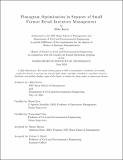| dc.contributor.advisor | Levi, Retsef | |
| dc.contributor.advisor | Ulm, Franz-Josef | |
| dc.contributor.author | Kurtz, Miles | |
| dc.date.accessioned | 2024-01-16T21:51:32Z | |
| dc.date.available | 2024-01-16T21:51:32Z | |
| dc.date.issued | 2023-06 | |
| dc.date.submitted | 2024-01-12T15:25:43.258Z | |
| dc.identifier.uri | https://hdl.handle.net/1721.1/153328 | |
| dc.description.abstract | Target is in the midst of building its "stores-as-hubs" capabilities, relying on stores to support in-store shopping and serve as ecommerce fulfillment hubs. To execute this strategy, Target has further expanded its footprint into urban and dense suburban geographies. The stores in these areas, referred to as Small Format stores, have less than half of the square footage compared to a traditional Target location and carry an order of magnitude less SKUs. The dynamics of Target's urban retailing, which are characterized for the first time in this study, require specific inventory strategies to maintain service levels with a smaller product assortment and fewer customer choices.
One metric to measure inventory management is `Fit', which considers an item's risk of generating backroom inventory in stores and the days of expected demand covered. Excess inventory decreases worker productivity, while insufficient inventory is associated with stockouts and lost sales. A mixed-integer linear program is developed to suggest the optimal shelf capacity for each product to maximize Fit. The decision model suggests sacrificing space allocated to high cube items to display more units of smaller items, and provides strong evidence for localizing Small Format assortments. A pilot of 10 test display units (planograms) was set and the effects measured via Synthetic Control Design (SCD). This research is part of a multi-year partnership between Target and MIT and is the first implementation of an in-store intervention. | |
| dc.publisher | Massachusetts Institute of Technology | |
| dc.rights | In Copyright - Educational Use Permitted | |
| dc.rights | Copyright retained by author(s) | |
| dc.rights.uri | https://rightsstatements.org/page/InC-EDU/1.0/ | |
| dc.title | Planogram Optimization in Support of Small Format Retail Inventory Management | |
| dc.type | Thesis | |
| dc.description.degree | M.B.A. | |
| dc.description.degree | S.M. | |
| dc.contributor.department | Sloan School of Management | |
| dc.contributor.department | Massachusetts Institute of Technology. Department of Civil and Environmental Engineering | |
| dc.identifier.orcid | https://orcid.org/0009-0000-8789-9490 | |
| mit.thesis.degree | Master | |
| thesis.degree.name | Master of Business Administration | |
| thesis.degree.name | Master of Science in Civil and Environmental Engineering | |
